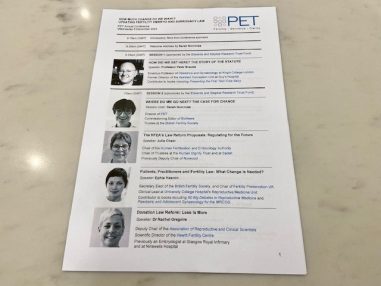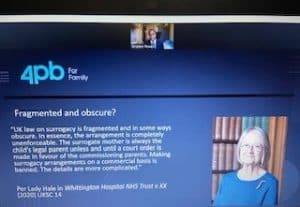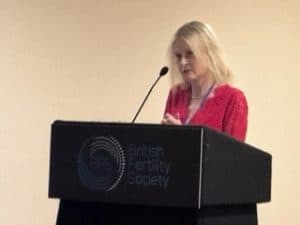14 December 2023
On 6 December 2023, Progress Educational Trust held its excellent Annual Conference “How Much Change Do We Want? Updating Fertility Embryo And Surrogacy Law”. The conference offered fascinating insight into the origins and history of fertility law in the UK, its evolution over time and the challenges we face moving forward given ongoing rapid developments in science, medicine and assisted reproductive technology. In doing so, it covered complex issues including extending the 14-day rule for embryo research, the case for removing donor anonymity at birth, use of “add-ons”, fertility treatment funding and expanding the HFEA’s powers to regulate fertility treatment delivery at UK fertility clinics.
Images: Julia Chain, Chair of the HFEA; Sarah Norcross, Director of Progress Educational Trust
History of UK Fertility Law
Professor Peter Braude, Emeritus Professor of Obstetrics and Gynaecology at King’s College London, charted the history of UK fertility law. He explained that the first human IVF started 50 years ago. He went on to say that Professor Robert Edwards encountered criticism for years before the successful birth of the world’s first IVF baby. Louise Brown. There were in fact two IVF pregnancies in 1973 and 1976, before Louise Brown’s birth at Oldham General Hospital in England on 25 July 1978.
Professor Peter Braude explained that the birth of Louise Brown led to a tumultuous reaction by the world’s media, set against a climate of fear and concern at the news. Following this, IVF practices continued to attract criticism due to conflicting moral values about the sanctity of life and the start of parenthood at fertilisation. As a result, Professor Edwards was not awarded the Nobel Prize in Medicine for his development of in vitro fertilisation (IVF) until 2010, just three years before he passed away. He was the only recipient of the award as his collaborators embryologist Jean Purdy and gynaecologist Patrick Steptoe had already died.
The development of IVF led to the Government’s decision in 1980 to appoint a commission, the Warnock Committee, to consider policy and make recommendations and which also took account of a live birth from a frozen embryo in 1984.The Warnock Committee delivered its report in July 1984, making 63 recommendations. Amongst these, it recommended that human embryos be afforded protection in law and that new legislation rather than guidance should be introduced to regulate IVF practises along with a regulatory body.
The Warnock Report generated disquiet by the Catholic Church and pro-life groups and in December 1984 Enoch Powell introduced the Unborn Children (Protection) Bill to parliament which attacked the Abortion Act 1967 and sought to treat fertilised eggs as a human being that had to be protected. There was significant support for the Bill in parliament, but concern remained that it was not reflective of wider societal opinion. There was hard fought political debate and the Bill eventually ran out of time in parliament. The Government then issued a Green Paper in 1986 and a White Paper in 1987 before introducing a Bill in 1990 (which became the Human Fertilisation and Embryology Act 1990) in the House or Lords where it was hoped it would receive an easier reception. The anti-abortion lobby tabled multiple amendments to reduce the limit for abortion, before it was eventually passed.
Professor Peter Braude ended his session by explaining that the Human Fertilisation and Embryology Act 1990 (HFE Act 1990) is still in operation, but the world is now a very different place and this raises all sorts of issues from a fertility law reform perspective looking ahead.
The HFEA’s Fertility Law Reform Proposals
Julia Chain, Chair of the Human Fertilisation and Embryology Authority (HFEA), explained that they sought to “future proof” fertility law in the UK. The number of fertility patients has increased 9-fold since the HFE Act 1990 was passed. She added that fertility treatment is now largely funded by the private sector and that a lot of the treatment process is now done online and not just at licensed fertility clinic premises. As such, the HFEA has put together 15 proposals to reform fertility law with focus on: patient safety and protection, access to donor information, consent to fertility treatment and scientific development and innovation.
The HFEA sought broader sanctions to address mis-selling of fertility treatment “add-ons”, including powers to fine UK fertility clinics. The HFEA also recommended the removal of donor anonymity from birth for donor conceived children given the power of social media and direct-to-consumer testing which means a donor’s anonymity can no longer be guaranteed. In addition, the HFEA wished to simplify the consent process, in particular around consent to donating to embryo research. Moreover, the HFE Act 1990 should be amended to “future proof” it and provide more flexibility to take account of rapid and unexpected scientific changes and greater use of Regulations as it is difficult to change the Act itself. As such, the HFEA proposed more flexibility rather than changes to specific limits applicable to embryo research.
Donor Conception Law Reform
Dr Rachel Gregoire, Scientific Director of the Hewitt Fertility Centre and Deputy Chair of the Association of Reproductive and Clinical Scientists, put forward the case for removing donor anonymity for donor conceived individuals at birth. She explained that this would end current age restrictions applicable to accessing donor information and result in a more equitable outcome for donor conceived people.
Dr Rachel Gregoire stated that fertility clinics should be required by law to inform donors and recipients about the potential for donor anonymity to be discovered through direct-to-consumer DNA testing. She went on to say that there should also be a global limit on the number of families born from a donor recruited and/or used in the UK. At present, there are no international donor limits and more than half of new sperm donors in the UK are imported from overseas and it not clear how many families that donor has created globally. She added, there is a social obligation to consider the impact of creating high numbers of donor-sibling children for ancestry, tracing, meeting, contact and consanguinity reasons.
Embryo Law Reform
Dr Peter Rugg-Gunn, Group Leader and Head of Public Engagement at the Babraham Institute and Scientific Lead at the Human Development Biology Initiative, went on to address future opportunities in human embryo research. He explained that this research benefits patients by advancing fertility treatment success rates, safety and by providing new treatment options. For example, improved culture methods allow close observation of early-stage embryos and advanced imaging, genetic editing in research embryos and bioengineering enable new opportunities.
Dr Peter Rugg-Gunn explained that the creation of a more agile regulatory framework would be beneficial in dealing with scientific advances. If the 14-day limit for in vitro development of human embryos was changed this could bring benefits for patients. He went on to explain that from 14 days – 4 weeks, the embryo enters the “black box” phase, of which there is currently limited scientific understanding. This is when the embryo starts to form human development but he stressed that there is no neural development or pain receptors during this period. He explained that benefits in extending the development of embryos beyond 14 days could lead to improvements in mitochondrial donation treatment. It could help improve understanding about the causes of early miscarriage and its treatment. It could also lead to further improvement in IVF success rates.
Dr Peter Rugg-Gunn explained that currently there is in vitro culture of non-human primate embryos up to 20 days, but this does not necessarily share the same development process as human embryos. As a result, we need more national conversations around extending the 14-day embryo research rule to enable scientific research to fill knowledge gaps.
Rethinking Parenthood
Professor Emily Jackson, Professor of Law at the London School of Economics and Political Science, then looked at parenthood. She explained that currently parenthood only applies to small numbers of people. She went on to explain that the law around parenthood is outdated and that it is based on being married or civilly partnered. Furthermore, there are problems in practice with the use of language which includes mother, father and second parent, as seen in families involving donor conception and transgender parents.
Professor Jackson explained that there therefore needed to be greater recognition of modern families. There should be gender-neutral language and use of “parent” rather than “mother” or “father”. She went on to say that there needed to be greater consideration and debate about whether it should be possible for a child to have three legal parents, for example to cater for families including a lesbian couple and a father. She added that law reform around parenthood should not necessarily be confined to the HFE Act 2008 either and there should be consideration as to whether it should also encompass review of the Births and Deaths Registration Act 1953.
Surrogacy Law Reform
Barrister Andrew Powell addressed the case for surrogacy law reform in the UK. In doing so, he opened with a statement from Lady Hale in Whittington Hospital NHS Trust v XX [2020] UKSC 14 in which she referred to surrogacy law in the UK as “fragmented and obscure”.* He went on to summarise the work of the Law Commissions of England, Wales and Scotland into surrogacy law reform and their final recommendation and draft legislation published on 29 March 2023. He added that the Government had provided an interim response on 9 November 2023 in which it explained that there was insufficient parliamentary time to take forward surrogacy law reform at the moment. You can read more about surrogacy law reform in the UK in our previous blog.
* Louisa Ghevaert provided expert witness surrogacy, fertility and donor conception law evidence for the Claimant in Whittington Hospital NHS Trust v XX [2020] UKSC 14.
Image: Louisa Ghevaert, CEO & Founder Louisa Ghevaert Associates.
Need Advisory & Consultancy, a Fertility Lawyer or a Modern Family Lawyer?
Images: Louisa Ghevaert, CEO & Founder Louisa Ghevaert Associates















